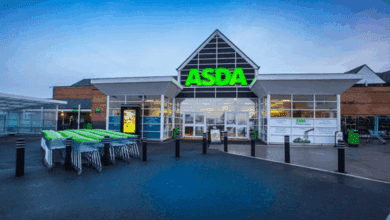‘It’s a disgrace for the planet’: what supermarkets should do to encourage the ethical consumption of food
Following last year’s trend which saw UK grocers scrap ‘Best Before’ dates on fruits and vegetables, M&S has recently decided to swap ‘Use By’ dates with ‘Best Before’ ones on its milk. Andy Needham, managing director of online discount retailer Approved Food, told us about how the distinction between these two expiration dates can help reduce food waste in the long run

Register to get 1 free article
Reveal the article below by registering for our email newsletter.
Want unlimited access? View Plans
Already have an account? Sign in
Ever since supermarkets last year ditched the ‘Use By’ dates of fruits and vegetables, this trend seems to have caught up again since M&S announced that it will start labelling milk with ‘Best Before’ dates. What do you think about this move?
I think there are ‘Use By’ dates on far too many products. I think that just by using a little bit of common sense, with the sniff test for example, we can avoid throwing things away unnecessarily. So it’s nice to see that we’re changing that and finally moving in the right direction.
Can you briefly remind us what is the difference between ‘Use By’ dates and ‘Best Before’ ones?
Basically ‘Best Before’ dates are just an indication of quality. So what the manufacturer is saying is that before this date, the products will be in perfect condition. After it, they may possibly deteriorate over time. ‘Use By’ dates are different, first of all because they’re a legal requirement. And they’re used to indicate that after that date the product is not safe to eat anymore. They’re usually used for products that go off quickly, such as meat.
If ‘Best Before’ dates are only a rough guide of when the product should be consumed, why can’t they be scrapped altogether and just leave the responsibility to the people regarding whether they want to consume something or not?
Well, I can actually remember the days when best before they didn’t exist. It’s something that’s come into play in the last 30 or 40 years. So it’s only fairly recent history where ‘Best Before’ dates have come into place and they don’t have a purpose. But I don’t think they’ll ever be scrapped.
I think what the shops should do is extend dates longer on things that shouldn’t have an arbitrary date. I’m thinking things like dried soup powders and noodles and tins and vegetables. They tend to put three year dates on these things but if you store them correctly they can last even 10 years.
Why do you think there is still misinformation surrounding ‘Best Before’ dates?
A lot of it does come down to education and knowing the difference between ‘Use By’ and ‘Best Before’ and their implications.
We at Approved Food have actually worked with an author of the CONES books to publish a book about the food waste problem. It’s coming out hopefully in three weeks time, it’s aimed at schoolchildren and it touches on all these topics, including the difference between the expiration dates. And what we hope to do with this book is educate the children from a young age, so that they can go and educate their parents too.
It’s an important subject and we’re doing our little bit, hopefully, to try and change things. For us the planet has only got limited resources and if we keep building them and wasting them like we are doing, then there won’t be much left for the next generations coming through. So it is important that we do talk about this right now.
What is the story behind Approved Food?
Approved Food has been going on for about 15 years and it’s entirely online. We buy products directly from manufacturers and distributors and resell them for a reduced price. And we have a wide variety of products, from food and drinks to pet food, household products and beauty. So far we’ve shipped out around 1.2 million orders.
So the products Approved Food sells, especially the food and drinks, are products that otherwise would just be wasted?
The majority of the time yes, because we tend to buy products that are short dated. Only in terms of ‘Best Before’ dates though, we never sell products past their ‘Use By’ dates. There’s a variety of reasons why these items would go to waste, they could be cancelled orders, overstocks, changes in packaging and designs. So basically we buy products that are a “problem” to the manufacturer, but which are still good.
We don’t buy from any supermarkets, we don’t take any food that’s been through the distribution channels and ended up at the retailer. It might be a product that was destined to go to a supermarket but the supermarket might have decided to reduce the order quantity that they wanted and as a result the stock becomes available for us to purchase.
Do you think more products could benefit from a switch to ‘Best Before’ dates just like what M&S is doing with milk?
I think it depends on the products. Some tend to stay fresher for longer and it also depends on how many miles a product has travelled. If it’s been drawn locally, it’ll last a lot longer than something that’s been brought in from the far east, for example. So there will be a gradual trend to look at things and say ‘That doesn’t really need a use by date on it’ and we’ll turn it into a best before date. I think this trend will continue, but it will be a slow, long process.
What do you think supermarkets should do to address food waste for products that are still safe to consume?
Supermarkets are the ones that really need to drive change but unfortunately they won’t be quick in changing dates because they have a vested interest in people throwing products away and then replacing them. So you’ll notice that supermarkets make no attempt whatsoever to try and explain the difference between ‘Use By’ and ‘Best Before’ to customers. They rely on people looking at a product and seeing that it’s out of date and automatically throwing it away. As a marketing tool it’s quite effective but for the planet, it’s a disgrace.






